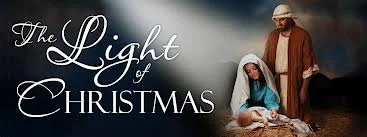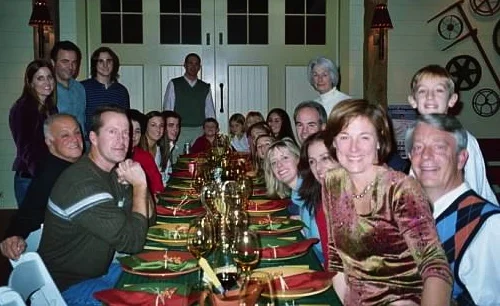by Joanie Butman
Last weekend my husband put the finishing touches on his Christmas decorations.He has been perfecting his craft since we moved here 15 years ago. If you could see the halo of light that surrounds our house, you would understand why I say that during December, Bob is a large contributor to global warming. His Christmas lights have been a source of enjoyment for many over the years. Nothing endears him more to our town than the light extravaganza he creates every Christmas. I use the term extravaganza loosely. Coming from Brooklyn, our light display seems pretty tame. However, in our staid community the fact that Bob has incorporated color into it is as daring as people get around here. Now that doesn’t mean it doesn’t come at a price. There were a couple of years when I couldn’t use the microwave during December without blowing out half of his display. In fact, Bob has overcome a multitude of technical challenges to keep his lights burning. Watching him synchronize his many timers is an Olympic event in itself.
To my surprise one person commented, “Whenever I drive by your house, it makes me happy.” We all have the capacity to bring light into someone’s life, regardless of whether we know them or not. In fact, many times you may never even realize it, as in my husband’s case. In every interaction we have with others we have the opportunity to either be a source of light or not. This ability takes on many forms: a smile, a kind word, a compliment, a thank you, an attentive ear, anything that conveys to that person that he or she is worth your time, your conversation, your attention. Nothing makes us feel more special than being affirmed by others. Conversely, nothing makes us feel worse than being invisible to or isolated from others.
I often tell people the story of our family is displayed in Bob’s lights for all to see. Bob is represented by the white band of lights at the foundation – stable, secure, dependable. On the other hand, Hannah, Doug and I are represented in the spikes of color that revolve around that base of white lights – more than a little volatile with lots of ups and downs. Each on its own would probably be nice, but the true beauty comes from the blending of its parts, much like our family. So it is with the community each of us is created to be a part of. We are all unique and bring a different aspect of beauty and talent into the community. On our own, we will never shine with the glory of blending all those personalities into a whole.
We are God’s light display for the rest of the world. The sacrifices Jesus and his disciples suffered to keep His light burning are unimaginable to us. Luckily, we are not asked to go to such extremes, but God does want others to see His light glowing in our lives. He wants to hear a similar compliment, “Whenever I see you, it makes me feel happy.” God reveals Himself to others through us, which is why it is so important to share our stories. Our testimonies are the pallet from which His portrait will be painted. When I choose to share accounts of how God works in my life, it isn’t for the purpose of converting anyone. It is simply to reveal a facet of the Divine others may not have had the opportunity to see before.
With this in mind, we need to remember the importance of choosing to make time for God – especially during the Christmas season with so many distractions pulling us in different directions. We need to choose to take time to allow Him to refill and reenergize us with His love and encouragement so that we, in turn, can do the same for others. A friend illustrated this point using the following analogy of how eagles rejuvenate themselves when they get tired. The eagle retreats to a secluded place, spreads its wings to face the sun and soaks up the sun’s warmth and energy until it is revived. In much the same way, we need to choose to take time to soak up the “Son” to renew and refresh ourselves. How can we expect to be a light to others if we allow our own to die out? Our relationship with God determines the quality of light we bring into our families, our communities, our world.
While God’s light has the ability to connect communities in a way that no technology can rival, He needs us to be His beacons. We can choose to do that by taking care of each other, by taking time (our most valuable asset) and devoting it to encouraging each other and building each other up. Our Christianity shouldn’t be defined by what church we belong to but how we choose to live our lives. When we take time to share in each other’s daily burdens, struggles, joys, sorrows, triumphs and failures, we embody the kind of light Christ brought into the world on that first Christmas. Jane Hillsmen describes His light beautifully, “Christmas will always be in the hearts of God’s children everywhere as they extend a helping hand to a friend in need…as they go about reflecting God’s goodness in the little quiet and unheralded expressions of a loving heart…as they share the light of the world with those who live in darkness.”
One more thing about my husband’s lights. As the trees grow, so does his light display whether he likes it or not. We have almost outgrown the super-duper ladder he relies on and may have to graduate to a bucket truck someday. The same is true in our spiritual growth. The more you grow (and spiritual growth is rarely painless), the higher your wattage. Just as Bob’s light display evolves each year, we are a constant work in progress. We often face our own technical challenges and need hypothetical fuses and bulbs replaced.
Then again, I firmly believe it is especially during those hardships that spiritual growth occurs and God’s light radiates the strongest for all to witness. That’s why it is so important (for me) to choose to plug into His light. Resting in the shelter of His everlasting arms is the way I choose to keep His light shining vibrantly regardless of life’s many obstacles. It is the gift of His light which brightens my life, not just on Christmas but every day of the year.

































